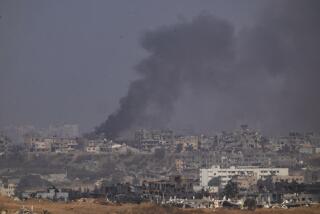Raid on War Crimes Suspects in Bosnia Is Boost for Peace Effort
- Share via
WASHINGTON — Thursday’s military action against two little-known indicted Serbian war crimes suspects in Bosnia may seem a minor, belated triumph on the part of those trying to make the country’s battered peace accords work.
In fact, it is much more.
The early morning raids, spearheaded by British participants in the NATO-led peace stabilization force, constitute an important boost for Western efforts to rebuild the shattered country.
Neither of Thursday’s targets has the notoriety of the war’s most-wanted suspects, former Bosnian Serb President Radovan Karadzic and Serbian military commander Ratko Mladic. But hospital director Milan Kovacevic and former local official Simo Drljaca were accused of organizing “ethnic cleansing” operations against Croats and Muslims during Bosnia-Herzegovina’s bitter war of the early 1990s. The raids show that the North Atlantic Treaty Organization-led peace implementation force in Bosnia can successfully confront indicted suspects, and that there is a political will in Western capitals to go after them.
“It’s a great day, a real breakthrough,” declared a clearly jubilant Christian Chartier, chief spokesman for the International Criminal Tribunal for the Former Yugoslavia in The Hague.
What Chartier and others were quick to stress was that Thursday’s actions were the result not of any change in the mandate of the stabilization troops, but in the determination to carry it out. “It is the first planned implementation of the mandate, and it is definitely important,” Chartier said. “It means that no one is exempt from this reach.”
Kovacevic was arrested; Drljaca died in an exchange of gunfire.
*
Terms of the accords agreed to at the 1995 peace conference in Dayton, Ohio, call for local leaders to turn over those indicted for war crimes. However, only the Muslim-led authorities have done so. Under the terms of their mandate, the NATO-led troops are supposed to arrest indicted suspects if they run into them, but until Thursday, this had never happened.
The continued freedom of Karadzic, Mladic and more than 70 lesser figures--all deeply opposed to the peace agreement that calls for their capture and all still wielding at least a degree of political power--constitutes a major threat to the accords.
“I have repeatedly argued that there can be no peace and reconciliation in Bosnia unless those who are responsible for the most appalling war crimes are brought to justice,” British Foreign Secretary Robin Cook told the House of Commons in London on Thursday.
Bosnia experts caution that it remains a giant step from Thursday’s modest success to arresting the likes of Karadzic and Mladic. Those familiar with the raids noted that the suspects were observed almost daily by British troops, were unaware they had been indicted by the Hague tribunal and moved around with no large personal security contingent.
“The context here was completely different,” stressed a senior U.S. official.
Despite that, the success of Thursday’s action, in which one British soldier was slightly wounded in the leg, is likely to have a ripple effect in Western corridors of power. It should provide at least a modest counter-balance to those still transfixed by the nightmare of Somalia, where 18 U.S. military personnel died in a futile, degrading chase to capture an errant warlord.
“We will take action as and when it is practical and sensible to do so,” British Defense Secretary George Robertson vowed in a statement to Parliament.
*
In the United States, where Pentagon caution has buttressed a broader reluctance to risk American lives to arrest indicted war criminals, the British-led action shows that the U.S. is not alone in taking the war criminals issue seriously and, more important, that it is not necessarily reckless to attempt the capture of suspects.
Indeed, the British success is likely to strengthen the hand of those such as Secretary of State Madeleine Albright who have argued that decisive action against the suspects is essential if the peace process is to have a real chance of taking hold.
Certainly, some important U.S. military voices have already changed their tune since July 4, the day President Clinton approved the participation of U.S. forces in support of the British plan. U.S. Army Gen. George A. Joulwan, the outgoing supreme commander of NATO forces in Europe, stunned the alliance’s summit in Madrid earlier this week when he stated that it was only “a lack of political will” by NATO leaders that stood in the way of picking up indicted war crimes suspects.
Any effective Bosnian Serb reprisal for Thursday’s action could dampen enthusiasm for taking a next step. But one British official insisted that his country’s forces are prepared to “snuff” any attempted retribution.
Balkans specialists cite several reasons why, 18 months after the NATO-led forces first entered the country, troops finally moved against indicted suspects. These sources believe a new sense of urgency sprang from Clinton’s visible efforts in recent months to reinvigorate the peace process, new evidence of Karadzic’s continued hold on political power in Serbian areas and a greater ability of the NATO-led troops, now less distracted by other tasks, to focus on war crimes.
“The president said on many occasions that he wants to be supportive of the war crimes tribunal, and we will continue to press for that objective,” a senior U.S. official said.
More to Read
Sign up for Essential California
The most important California stories and recommendations in your inbox every morning.
You may occasionally receive promotional content from the Los Angeles Times.













